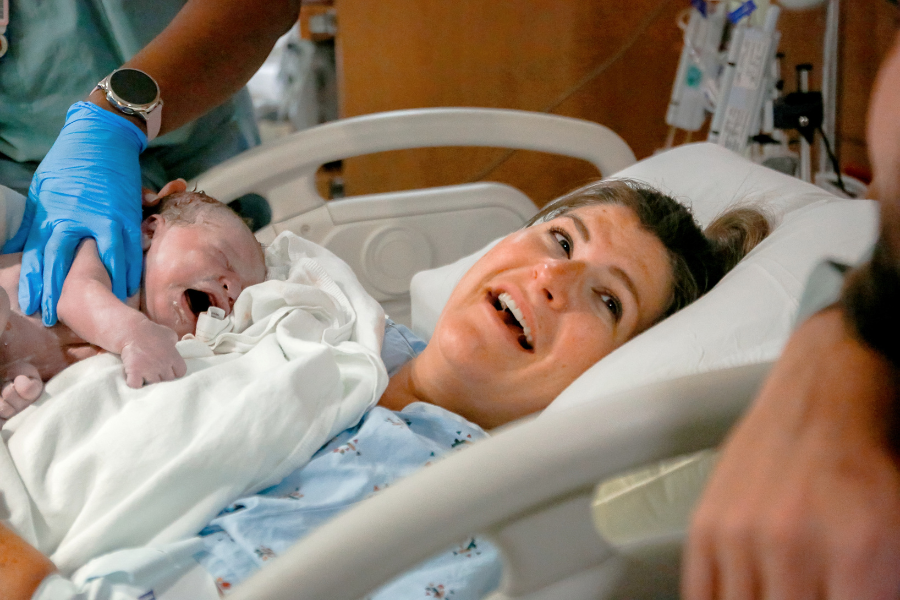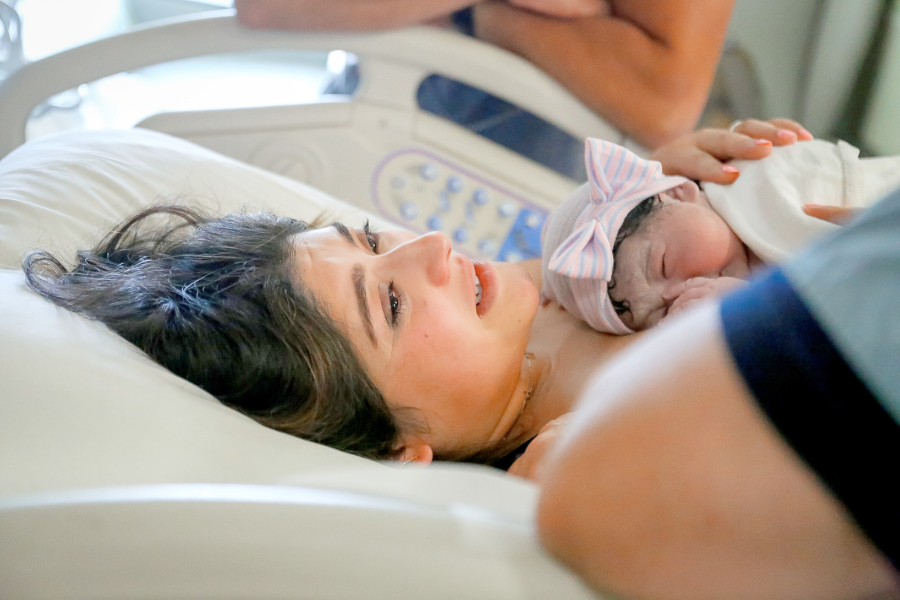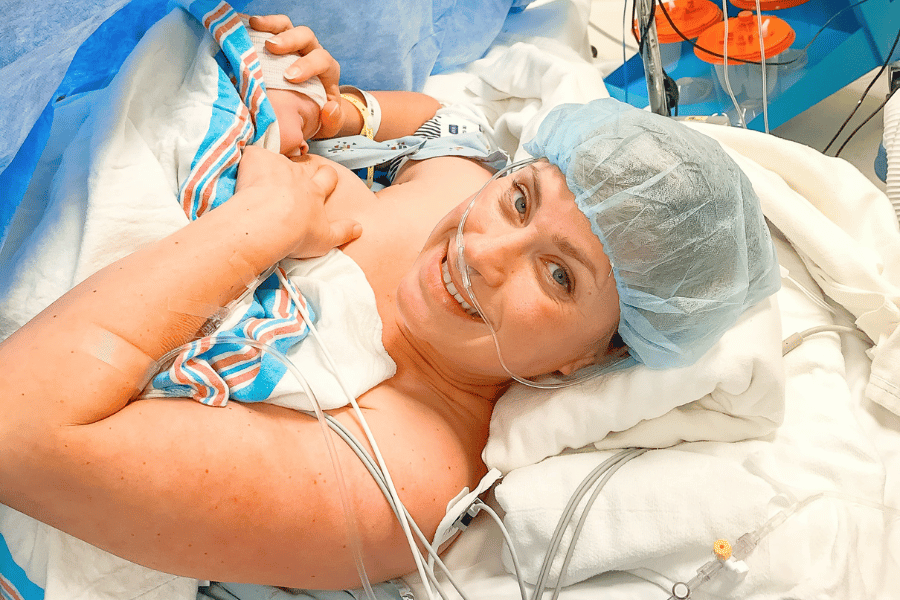Can you take a bath while pregnant? It’s the million-dollar question that stirs up confusion for pregnant mamas everywhere!
There’s been a myth surrounding baths in pregnancy circling around for ages. If you are ready to learn about where and why this myth started, if there’s any truth to it, and finally, if you can take a bath while pregnant, you will want to read on for more info!
Ready to debunk this theory? Let’s dive in, mama.
Follow @mommy.labornurse on Instagram to join our community of over 650k for education, tips, and solidarity on all things pregnancy, birth, and postpartum!
Can you take a bath while pregnant?
The simple answer to this question is, of course, you can! Why then is there so much controversy surrounding baths during pregnancy? Ultimately it boils down to the temperature of the water – see what I did there? Ha! That, and the length of your exposure.
Piping hot baths can raise your body temperature to dangerous levels, not to mention burn your skin. Both of these are things you definitely want to avoid during pregnancy!
How hot is too hot for a bath while pregnant?
How hot is piping hot? So, there is some discretion as to what magic temperature makes a bath too hot for pregnancy. WebMD says nothing over 98° F while other sources recommend keeping the temperature below 100° F – 102° F.
My official recommendation? Don’t step into a bath where you’re uncomfortably hot. If you are uncomfortable, the temperature is likely too high and therefore you should avoid it until it cools off a bit.
If you want to be extra sure, you can always grab a thermometer from the kitchen (or medicine cabinet!) to double-check the temperature before you get in.
Why are really hot baths dangerous during pregnancy?
You might be asking yourself, “What’s the big deal with elevating my body temperature in pregnancy?”
There have been studies conducted that show there can be negative side effects related to elevated body temperature in pregnancy. Typically, the potential risk is present if the temperature is above a certain degree for a certain amount of time. This is especially true in the first trimester when so much fetal development is taking place.
Therefore, as a rule of thumb, it is best to avoid using hot tubs and saunas in early pregnancy.
“Some studies suggest that using saunas and hot tubs early in pregnancy, especially for long periods of time, is associated with birth defects. Your core body temperature rises when you use saunas and hot tubs. This rise in temperature can be harmful to your fetus.”
According to the American College of Obstetricians and Gynecologists (ACOG)
8 Ways to make your bath pregnancy-safe
I don’t know about you, but I am definitely team bath, especially during pregnancy. It was one of the things I did, and still do, to relax and unwind.
As a pregnant woman reading this article, I’m sure you can agree that relaxing activities are pretty hard to come by in pregnancy.
If I haven’t sold you on the safety of a bath in pregnancy just yet, I’m going to go over some ways to make your bath pregnancy-safe:
- Avoid saunas and hot tubs
- Avoid water temperatures higher than 100° F (warm or tepid water only)
- Monitor the temperature with a bath thermometer (it’s actually a thing, and I have one on my Amazon Storefront – bonus, you can use it for baby’s bath too!)
- Limit baths to 10 minutes to avoid overheating or dehydration (especially in the first trimester)
- Avoid bath salts and bubble bath (epsom salts should be okay)
- Use a non-slip mat
- Keep a big bottle or cup of water next to the bath – hydration is SO important!
- If at any point you begin to feel dizzy or light-headed, get some assistance and get out of the bath promptly – you might be experiencing dehydration or getting overheated
Related Reading: Amazing Ways to Relax During Pregnancy to Reduce Stress
Benefits of taking a bath while pregnant
The benefits of taking a bath while pregnant are plentiful, with the most obvious and noteworthy benefits being relaxation and easing aches and pains.
A bath can provide relaxation and pain relief during any trimester, but there are benefits that might be more specific to one trimester over another.
Benefits of taking a bath during the first trimester
You might not be needing the pain relief aspect from a warm bath just yet, but I guarantee the stress and excitement of a new pregnancy will have you looking for ways to relax.
If you are anything like the majority of women in the first trimester, you are struggling with some pretty significant exhaustion, fatigue, bloating, and tender breasts.
For the most part, I can’t complain about my pregnancies, but there were definitely days that were a little touch-and-go early on. One of the things I often did to help myself unwind and relax in my first trimester was to take a bath.
Related Reading: Early Signs of Pregnancy and Weird Pregnancy Symptoms that are Actually a Thing
Benefits of taking a bath in the second trimester
A lot of mamas feel relief from some of the unfavorable first-trimester symptoms once they hit their second trimester.
A new trimester can also bring new aches and pains. A growing uterus means a growing belly, which might mean round ligament pain and the beginning of Braxton Hicks contractions.
One of my favorite tips for relief from both Braxton Hicks and round ligament pain (and lots of other pregnancy-related ailments) is…you guessed it, a warm bath!
In addition to helping you relax and unwind, a warm (but not too warm) bath can do wonders for soothing those achy muscles and ligaments.
Benefits of taking a bath in the third trimester
Well, hello there, third trimester! Getting closer to eviction day means that your baby (and therefore your belly) is growing like a weed – but the most adorable weed ever!
In addition to the round ligament pain and the Braxton Hicks contractions, there is a decent chance you are also now dealing with hemorrhoids, swelling, and insomnia. All of which a nice, warm bath can help!
Swelling in pregnancy
Swelling is a normal part of pregnancy – especially in the third trimester – but it can also be an indicator of a bigger problem.
I always advise women to let their provider know if they experience swelling during pregnancy, especially if the swelling is extreme or sudden or if it’s accompanied by:
- Headache that won’t go away
- Vision changes
- Sudden weight gain
- Stomach, shoulder, or lower back pain
- Sudden nausea
- Shortness of breath
- Chest pain
Your provider may want to rule out a condition called preeclampsia if your swelling is accompanied by other symptoms. If you are concerned you might have preeclampsia or want to learn more check out my article about gestational hypertension – and definitely make your provider aware!
Hemorrhoids, another pregnancy joy! Over half of pregnant women experience hemorrhoids so if you are one of them, you are definitely not alone!
Basically, hemorrhoids are swollen veins near the rectum. Depending on how large they get, they can be quite uncomfortable.
One way to ease swelling discomfort, whether it be in your feet, related to hemorrhoids, or in your labia – yep, that’s a thing too (learn more about it in our third trimester FAQ article), is with warm water!
Epsom bath during pregnancy
And for an added bonus, throw some Epsom salt in your bath. Epsom salt has anti-inflammatory properties that can help reduce inflammation and ease those aches and pains.
For an Epsom salt bath, fill your tub (or basin if you only want to soak your feet) with warm water, add Epsom salt (2 cups for a standard-size bathtub or ¾ cup if using a basin), let the salt completely dissolve, and enjoy for 10-15 minutes (or a bit longer if you are only soaking your feet).
When should you NOT take a bath during pregnancy?
Many providers will recommend avoiding a bath once your water is broken. There is conflicting information about whether or not sitting in bath water after your water is broken can increase your risk for infection.
Definitely run this one by your provider to see where they stand on the topic. Either way, hopping in the shower after your water has broken should be perfectly fine.
To piggyback the above info, you should absolutely run taking baths by your provider if you have anything in pregnancy that makes your pregnancy high-risk, especially if you are experiencing any amount of vaginal bleeding.
Can you take a bath while in labor?
Hydrotherapy, and I’m not talking about drinking water, is one of the pain-coping techniques I talk about in my online Birth It Up birth courses. There’s actually a saying that “water is nature’s epidural”, and I couldn’t agree more!
A warm bath or shower can be so helpful for easing contraction pain.
In my first labor, I loved the shower and hated the tub. During my second labor, however, I loved soaking in the tub during active labor and truly think laboring in the tub is what helped me achieve my goal of an epidural-free birth!
Using hydrotherapy at the hospital
Many hospitals have waterproof monitors that you can wear during a shower or bath if you are requiring continuous fetal monitoring. If you have your heart set on hydrotherapy during labor, definitely talk to your provider about this ahead of time so you know what your options are.
Some facilities and providers are more “water-friendly” than others, so it’s good to know these kinds of things earlier on in pregnancy rather than being unpleasantly surprised on the big day!
If you are interested in learning more about the benefits of hydrotherapy and other pain meds during labor, you will definitely want to read this article, Pain Meds Other Than Epidurals for Birth!
Can you take a bath after giving birth?
Yes, you can take a bath after giving birth, but when you can take a bath after giving birth depends on a few things, including whether you had a vaginal or C-section birth. To be extra safe, it’s best to run it by your provider before hopping in the tub.
When can you take a bath after giving birth?
Generally, it is recommended to wait at least 4-6 weeks to submerge your abdomen in water after a C-section.
Following a vaginal birth, it depends on the degree of tear you experienced and your recovery, but it could be as soon as a couple days or as long as several weeks.
Someone that experienced an episiotomy or a third or fourth-degree tear will likely need to wait longer than someone without any tearing.
For a more accurate timeframe, specific to you and your delivery, make sure you ask your OB provider prior to being discharged. You can also call the office after you have been discharged if questions or concerns come up. I’m all about erring on the side of caution, you feel me?
Sitz baths after birth (and during pregnancy!)
View this post on Instagram
If you’re desperate for a bath but haven’t yet gotten the green light from your provider, you might want to consider a sitz bath – a little bath for your perineal region. These things are the bomb and have so many benefits!
During pregnancy, a sitz bath can be used to reduce inflammation and discomfort caused by hemorrhoids. After delivery, a sitz bath can be used to provide relief from tears, soreness, hemorrhoids, and just overall discomfort down there.
There are so many sitz bath apparatuses out there, personally, this is the one that I used and loved.
And if you are looking for more postpartum essentials to help make that transition a little bit easier, be sure to check out my Amazon Storefront and read more about Must-Have Postpartum Essentials for Mom and Baby!
Baths during pregnancy explained!
So, there you have it! The mysterious “bath in pregnancy” theory debunked! Just remember to use warm – not crazy hot, steamy – water, listen to your body to make sure you aren’t becoming dehydrated, and limit the time you spend in the tub, and you should be A-OK!
And having been in your shoes (two times now!), I know how much you need and deserve a little something to help you relax and unwind!
Keep learning more with these articles:






